Remembering the victims of the Bosnian Genocide
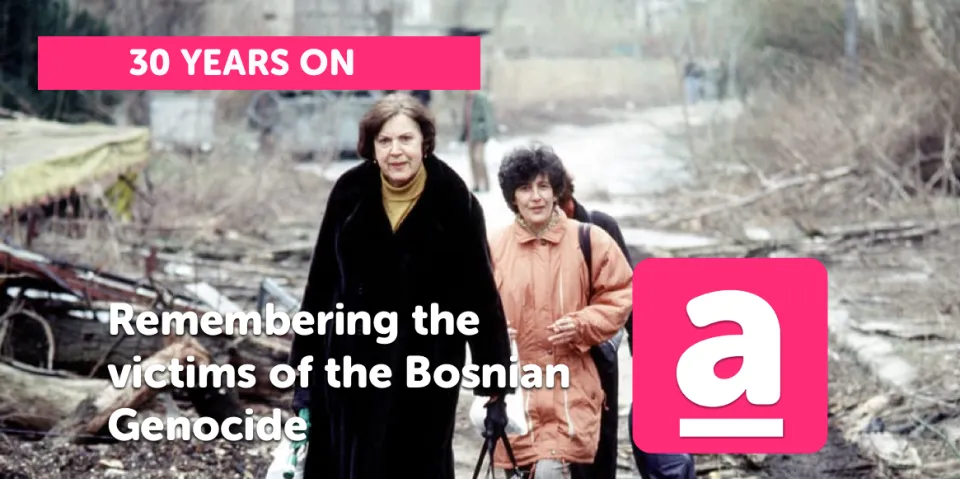
IN 2025, WE REMEMBER 30 YEARS SINCE since the end of the Bosnian war. The conflict followed the breakdown of the former Soviet state Yugoslavia in 1991. In 1992 the government of Bosnia declared independence, creating a new nation with an ethnic Bosnian majority and a Serb and Croat minority. Bosnian Serbs launched a military campaign targeting the Muslim civilian population.
In the ensuing three years of chaos and violence, Bosnian Serb forces led a wave of ‘ethnic cleansing’ targeting Bosnian Muslims and Croats. The brutal war is known for the widespread human rights abuses and war crimes committed, including civilian massacres.
The seige of Sarajevo became the longest seige of a capital city in the history of modern warfare. Over 1,425 gruelling days, the Bosnian Serb army dropped over half a million bombs on the predominantly civilian population. Nearly 14 thousand people were killed in Sarajevo alone, around 5 and a half thousand of them civilians.

The UN refused to militarily intervene in the war, instead facilitating humanitarian aid and declaring “safe areas”. Several attempts at instigating a peace process failed, as the Bosnian Serbs refused to concede any territory. In 1994 NATO began air striking Bosnian Serb military targets.
During the conflict, thousands of civilians were sent to concentration camps where many were beaten, tortured, starved, raped or killed. Rape was systematically used against women and girls as a weapon of war.
Experts estimate that between 20,000 and 50,000 women were raped during the conflict, the majority of these Bosnian Muslims abused by members of the Serb forces.
In July 1995 Serb forces entered Srebrenica, a town that had been officially declared safe by the UN. 8,000 Bosnian men and boys were murdered in Srebrenica, the largest massacre in Europe since the Holocaust. More information about what happened is available from the Holocaust Memorial Day Trust and the UK-based Remembering Srebrenica initiative.
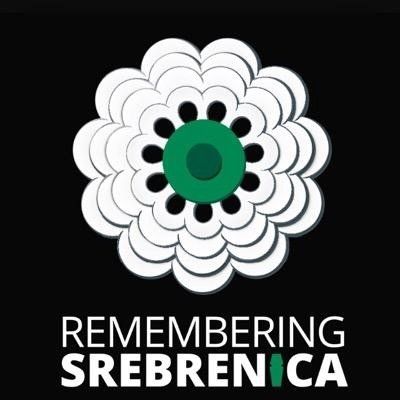
When news of the Srebrenica massacre broke, NATO began escalating their airstrikes. With Bosnian Croats mobilising a land offensive, the Bosnian Serbs were forced to the negotiating table. By then around 100,000 people had been killed.
The war came to an end after a NATO-backed peace treaty was signed in the US in December 1995. In the aftermath, the UN established the International Criminal Tribunal for the former Yugoslavia. It successfully tried and sentenced several key political and military figures for genocide and crimes against humanity.

The horrors of a decades-long conflict on the other side of the continent may feel far removed from Stroud. But the long shadow of genocide is cast on communities across the world, as we strive to honour the dead and learn the lessons from history's darkest chapters. Here in the Five Valleys, we are casting a spotlight on the conflict, and hearing from our own community members who experienced it at first-hand.
Community Solidarity Stroud District spoke to local resident Damir Kljajic’s mother who shared her story from the start of the conflict.
She was a 50 year old school teacher when the war broke out, with ethnic violence and political chaos tearing communities apart. As an ethnic Croat married to a Bosnian man, her family were at serious risk of persecution.
Suspicions and subjugation escalated before her eyes while living in a small secular town in the Bosnian countryside, not too different in size from Stroud.
This is her account of being put under house arrest and eventually forced to leave her home at the beginning of the genocide.
Mama’s War
One woman's experience of escaping from Bosnia
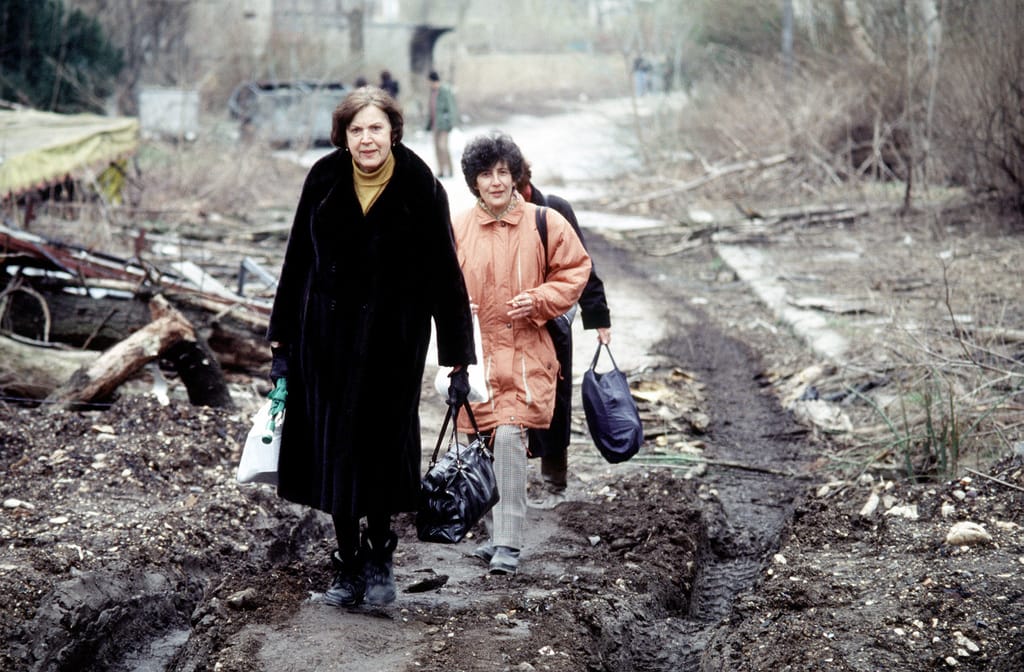
TO HELP ME MAKE SENSE of the Bosnian war I recall a conversation with my father in 1987. He said: “Nasty things are going to happen in Bosnia. I cannot guarantee my predictions and I do not know how to help but…”
I was surprised with his words. I thought it the ravings of an 84 year old man and I couldn’t take it too seriously. He died shortly after in January 1988.
“I felt confused, dizzy, offended, degraded and bewildered.”
In June 1991 my colleague visits us at home. Not only have we worked together, but we are friends and socialise regularly.
She delivers a document by which I am fired from work, saying:
“Management sent me to deliver this to you. Don’t be angry as WE can lose our jobs too.”
I felt confused, dizzy, offended, degraded and bewildered. Who are WE? I had worked, as a teacher with her, in that school for thirty years.
That same day the military police visit. They interrogate us regarding weapons, and take my husband for further interrogation. He is a retired territorial army officer.
My son Damir has left this hell 11 days ago. I watched his departure hidden behind the curtain. Fear consumes me but at the same time my thoughts are: “Let him be safe, even if I don’t see him any more!”
A young colleague who lives in the same building notifies me that going out is forbidden. Life continues with constant peeping behind the curtain.
“Now, religion makes them different, less human, a reason to be killed.”
Uniformed groups are taking people (Catholics and Muslims) to interrogations. I am deliberately not calling them Croats and Bosniaks. They were all born here, they attended the same school, all supported the same local football teams, all attended weddings and funerals together.
One day I am allowed to go to the bank. There is the ever-present young colleague, patrolling the apartment block corridors, observing who is talking to whom.
Outside at the crossroads, among a group of armed men, is another colleague of mine. We worked together for 20 years. He is avoiding me, pretending to pay attention to something else, turning his back to me. As I pass I can hear steps behind me. I do not know what to expect. Maybe this is the end? Quietly he calls my name. I stop. Fear consumes me.
He whispers “Sorry! Please remember I am ashamed. I am ashamed even to look you in the eye.”
Arrests continue. My life consists of peeping through the window behind the curtain. There are more and more armed men who do not belong to this town. However in these armed groups, there is always one local person pointing out who lives at a specific house and who should be arrested and in some cases killed.
Often I walk through the apartment building hallways as going out of the building is forbidden. I meet a woman I know, from a neighbouring building, with handfuls of bags, coats and jackets. Once, I cannot explain why, I ask her what she is carrying? Without shame she replies: “I am taking stuff from abandoned flats for the army!”
By left I mean kicked out, possessions taken.
We learn that my husband’s first cousin has died. He was taken to prison, beaten up, sent home and died in the morning. His mixed marriage didn’t save him, he was dead.
One night a neighbour from our building, a judge at the local court, scratches on our door about 3am.
It is dangerous for him to visit us. He brought us a couple of apples, cried talking about the situation, paralysed with fear for his young children. His brothers are in charge of the political party that led to this madness. One of them is a highly placed army officer.
“Former friends and colleagues are passing by pretending that we do not exist.”
We have an opportunity to leave. This means leaving all our belongings, our flat, everything and to pay for the cost of transport.
The same evening someone knocked at the door. It was unwritten rule for women to open the door. If men did that they would, often, be beaten up on the spot or even killed. Three soldiers demanded the car keys: “For the army!” they said. All night they drive our car up and down the street, revving the engine, honking the horn. When they have had enough they smashed the car into the wall.
One bag. That is all what we were allowed to take. Our whole life was to be squeezed into one bag. I leave my son’s trumpet with a friend hoping one day he will be able to retrieve it. No words can describe leaving my house, locking the door.
We are waiting for the buses behind the cordons in front of the town hall.
Former friends and colleagues are passing by pretending that we do not exist. We were taken across the mountain towards central Bosnia. The bus stops and my husband is taken off without explanation. The buses are ordered to continue. I run out of the bus after them. I don’t remember what I was saying but manage to pass him his medication.
We are dumped several kilometres before the front line and ordered to continue on foot to the border. We are placed in the former barracks in Travnik.
Some of my former pupils are here who care for me and bring me food.
“I am so full of anger and hatred, I cannot describe my feelings.”
I visit the army headquarters to enquire again about my husband. An officer shows me some papers and asks “Excuse me, do you know how to read or shall I read this to you?”
I don’t have any tears left to cry. I hear myself reply “Yes, yes, I know how to read.” I can imagine how I must have appeared. A teacher with 30 years’ experience so down trodden I might be illiterate. Ironically I probably taught him or even his parents how to read.
One day one of my former pupils woke me up: “Miss, miss, he is here!”
We embraced, no words, no tears, dirty, tired, happy, humiliated … I swore.
With the next convoy of refugees we continued towards Croatia.
I pull out my birth certificate shouting: “Who are you going to deny entry to Croatia? I was born there. My Mother, my brothers, my family are there. I am going home. Bastard!” My husband tries unsuccessfully to calm me down.
The official just turned and left. Without asking we boarded the bus and entered Croatia. Here we finally learned that our dear son had managed to reach my mother’s home and is safe.
After over 100 days of hell I am back in my mother’s house which I left in 1961 to start my new life and build my own family in Bosnia. I possess nothing, I am dirty, scared, exhausted but we were all alive.
We hear the news that our neighbour, the kindly judge, was eventually sent to a front by his brothers and was killed. Despite him being (against his will) a soldier on the side that had destroyed our lives, both my husband and myself cry for him.
He was a good man.
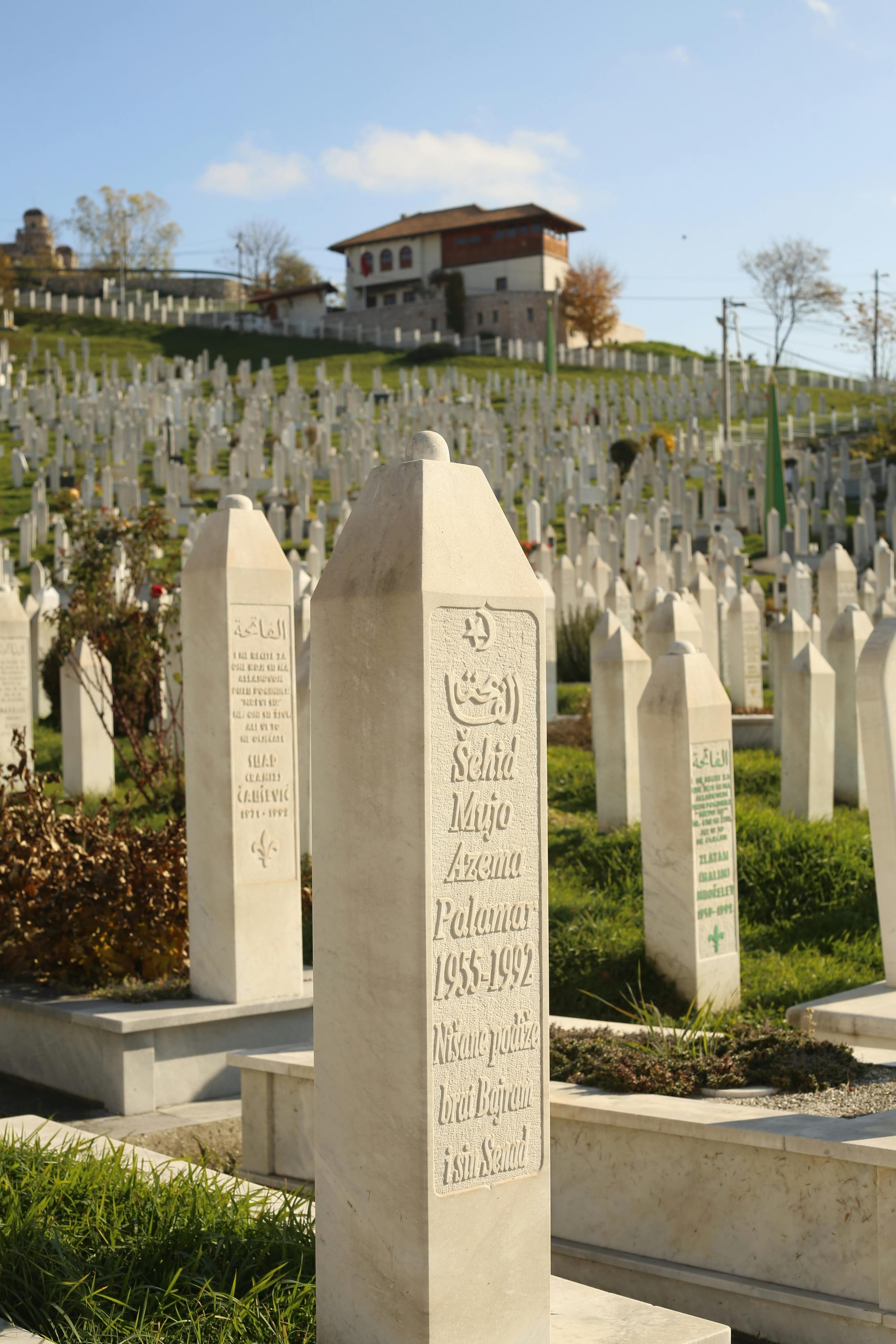
This interview was originally published in 2023 by Community Solidarity Stroud District, and has been updated for publication by Amplify Stroud.
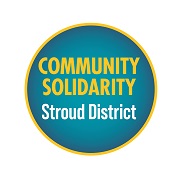

Amplify Stroud is supported by Dialect rural writers collective. Dialect offers mentorship, encouragement and self-study courses as well as publishing.
You can find out more at https://www.dialect.org.uk/

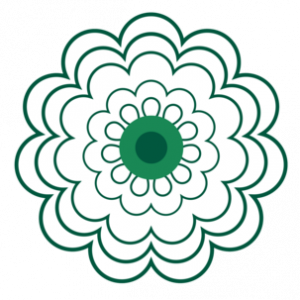
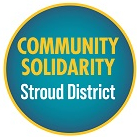

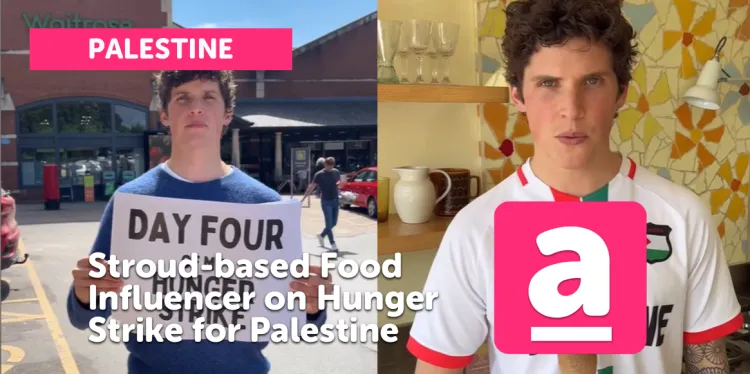
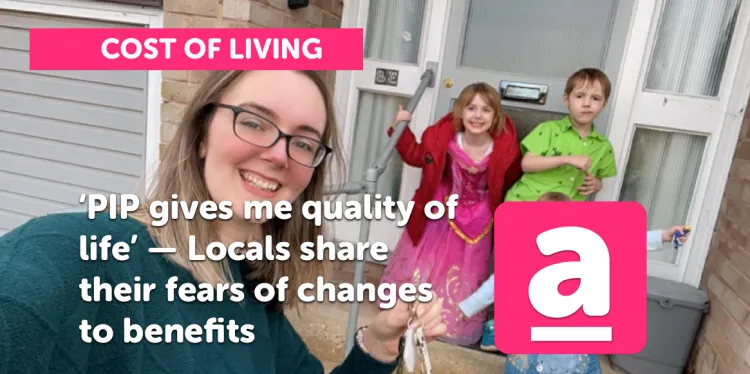
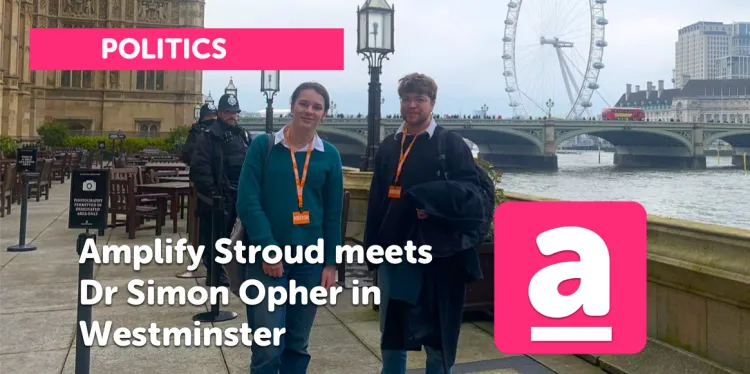

Member discussion